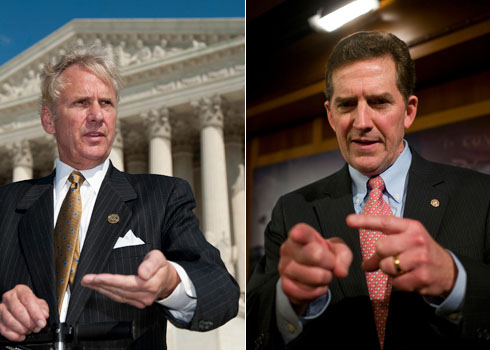The arguments of a group of Republican state attorneys general who are talking up a constitutional challenge to the “Cornhusker Kickback” provision of the health care bill are “strictly political” and do not have legal merit, a law professor tells TPMmuckraker.
“If a private individual brought the suit, the court might assess a fine for bringing a frivolous suit,” says Timothy Jost, a health law specialist at the Washington and Lee University School of Law who favors the reform bill.
The effort being led by South Carolina Attorney General (and gubernatorial candidate) Henry McMaster focuses on a measure in the Senate bill secured by Ben Nelson (D-NE), under which the federal government would fully pay for the expansion of Medicaid in Nebraska, saving the state $100 million in 10 years. Other states would have to share the new costs with the federal government, as they do now.
Republican Sens. Lindsey Graham and Jim DeMint asked McMaster to review the constitutionality of the provision because “it results in special treatment for only one state in the nation.” McMaster is now joined by nine other GOP state AGs, including Tom Corbett of Pennsylvania and Mike Cox of Michigan, who, like McMaster, are running for governor.
The AGs have blasted the measure as a “backroom deal of the worst kind” and voiced “serious concerns about equity, tax fairness.” But much less clear are the constitutional grounds on which the group objects to the Nelson provision. Several of the AGs’ offices have not returned calls for comment.
In the most specific explanation to date, DeMint told McClatchy that the provision would violate Article I, Section 9: “No preference shall be given by any regulation of commerce or revenue to the ports of one State over those of another.”
But Jost says that when Article 1 Section 9 has been cited — a rare occurrence — “it has explicitly been used to deal with Congress trying to favor one port in the United States as opposed to some other port.”
“Which port in Nebraska are they concerned about?” Jost asks. The clause, he says, “cannot conceivably have anything to do with Medicaid.”
Jost notes that while the Constitution does require uniformity in taxes among the states, the Nebraska Medicaid provision is about spending, not taxation.
“There’s no equivalent requirement that spending has to be uniform among the states — and of course it isn’t, it has never been, and never will be,” he says.
Federal financing of Medicaid has always favored certain (often poorer) states, though the Senate health care bill is more brazen than past legislation in that it singles out Nebraska by name, according to Jost.
Mark Tushnet, a constitutional law professor at Harvard, tells TPMmuckraker that “it’s really hard to come up with an even half-plausible argument to support the AGs’ position” using the “ports preference clause” of Article 1, Section 9.
He believes there is a slightly more viable equal protection argument against the Nelson provision. But Tushnet says such an argument could be defeated in court by satisfying a so-called “rational basis” standard for favoring Nebraska. For example, the government could argue that the Senate’s ultimate goal was for every state’s Medicaid costs to be covered in full, and that the Senate was just starting with Nebraska.
Adds Steven Schwinn of the John Marshall Law School and the Constitutional Law Prof blog: “This is pretty clearly politically motivated and a lame attempt to constitutionalize ordinary politics.”
If the Nelson measure survives and the Republican AGs sue, Jost expects their suit to be promptly thrown out of court.
At this point, the attorneys general in the McMaster group do not seem to be on the same page about what they are specifically objecting to.
Here’s a clip of Alabama’s Troy King explaining that he opposes the Nelson provision because the Founding Fathers “never contemplated” the Constitution being used to buy and sell votes “in a backroom in the United States Senate”:
(This post has been revised to include comment from Tushnet and Schwinn.)






